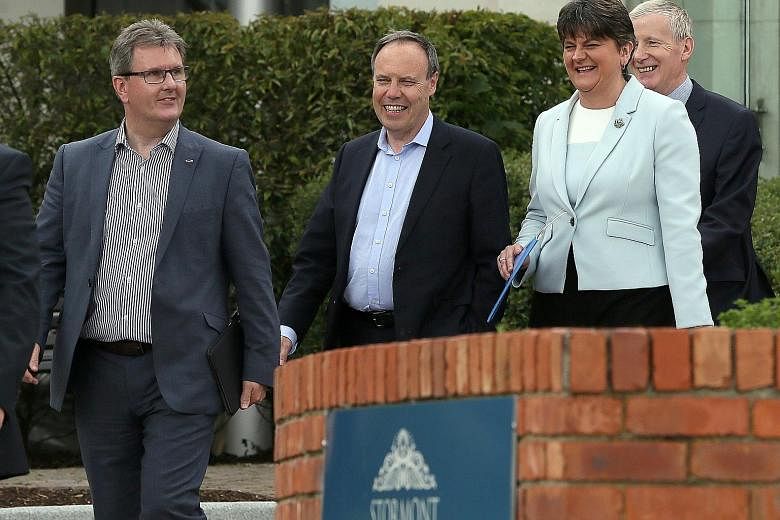After a disastrous general election for Prime Minister Theresa May, Britain's Conservative government may now be propped up by a small Northern Irish party, the Democratic Unionist Party (DUP), but this threatens to result in more problems for the Tories.
Ultra-conservative and populist, the DUP opposes gay rights and abortion while supporting the teaching of Biblical creationism in schools, a stance that puts it at odds with mainstream British politics.
A possible partnership with the DUP has already caused concern.
Popular Scottish Conservative leader Ruth Davidson, who is gay, told the BBC she had asked Mrs May "for a categoric assurance" that, if any deal were to be sealed with the DUP, there would be "absolutely no rescission" of lesbian, gay, bisexual and transgender rights in the rest of Britain, and that the government would try to advance LGBT rights in Northern Ireland.
A partnership between the Conservatives and the DUP may threaten the ability of the British government to be a neutral broker between the unionists and the nationalists, Mr Jonathan Powell, former chief British government negotiator on Northern Ireland, wrote in The Guardian.
"I know that Mrs May is desperate to find some way to cling on to power in Westminster, but I appeal to her to reconsider doing so propped up by one side from Northern Ireland politics. Doing so would risk undermining 20 years of hard work in trying to reach a lasting settlement," he wrote.
Northern Ireland, composed of the six north-eastern counties of Ireland, remained under British rule when the rest of Ireland became independent in 1922.
-
How 'confidence and supply' deal works
-
LONDON • After last Thursday's election, the Conservatives ended up with just 318 seats - fewer than the 326 needed to govern.
The Conservatives and Northern Ireland's Democratic Unionist Party are trying to agree on an informal "confidence and supply" deal, different from a formal coalition.
This is how a "confidence and supply" deal works:
The smaller parties agree to vote for, or possibly abstain on, the Queen's Speech set out by the minority government.
The Queen's Speech is seen as the first test of a minority or coalition government. If the vote on the speech is lost, or if any amendments to it are passed by the House of Commons, the British Prime Minister must resign, the Daily Mirror reported.
The "confidence" part means supporting the government on votes of no-confidence in the government or its leadership.
The smaller parties also agree to back any Bills needed for the government to receive money to carry out its policies.
While such a deal does not usually come with guaranteed ministerial jobs, the Daily Mirror reported, it typically involves having some elements of the smaller parties' manifesto enacted by the minority government in exchange for the parties' support.
Northern Ireland had previously been plagued by a low-intensity civil war usually referred to euphemistically as "The Troubles", which saw Irish republicans resist the pro-British unionist domination of Parliament, with the paramilitary Irish Republican Army fighting to reunify all of Ireland in the face of decades of discrimination against the largely Catholic republican population.
The conflict, which claimed more than 3,500 lives in the course of three decades, came to an end in the late 1990s, with the 1998 Belfast Agreement. The agreement called for a new Northern Ireland governing assembly with power shared between the largely Protestant pro-British unionists and Catholic pro-Irish republicans.
The DUP has its roots in this conflict. It was perhaps the most ardent of the parties in supporting Brexit, but is likely to demand concessions from Mrs May.
Irish republicans, who had once been hostile to the European Union, came to see it as a vital link with the rest of Ireland, and liberal and middle-class unionists voted in large numbers to stay in the EU as well.
There is also the issue of EU grant aid to Northern Ireland: The DUP will doubtlessly seek assurances from Mrs May that Westminster's coffers will replace lost EU funds.
Ultimately, Mrs May's snap election and her need for an ad hoc partnership with the DUP has weakened, rather then strengthened, her hand at the negotiating table.

